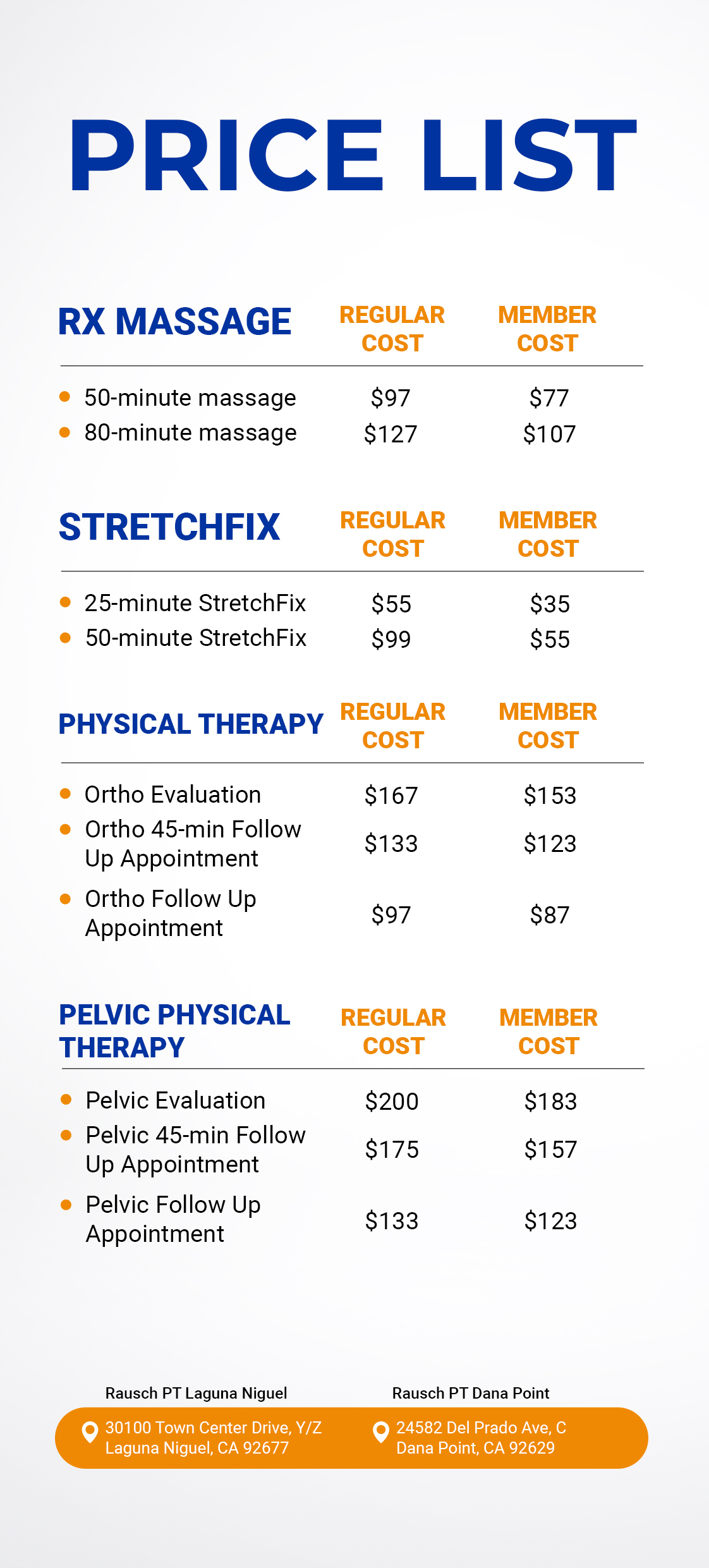1. Bring Mindfulness Into Your Day Stress and anxiety don’t just affect your mind—they impact your nervous system, sleep, recovery, and even how your body experiences pain. Mindfulness and meditation,
Everything About Muscle Pain
June 1, 2024 10:17 am / Category: Dana Point

Muscle pain is extremely common and will affect nearly everyone at some point. Activities like heavy lifting workouts, lifestyle factors like excessive stress, and chronic conditions can cause or worsen it. Learn how to address this problem.
Everything You Need to Know About Muscle Pain
Read on to learn what may be causing your pain and how to relieve it.
Common Causes of Muscle Pain
Muscle pain happens because of overuse, injury, stress, and tension, whether from an intense workout or hard physical work. In these cases, connecting the pain with the cause is easy. Other reasons like life stresses aren’t as easy to pinpoint. Here’s a look at a few of the more common causes of muscle pain.
Delayed Onset Muscle Soreness (DOMS)
Delayed onset muscle soreness (DOMS) refers to the pain and stiffness you feel after working out harder or longer than usual. Researchers used to believe it involved just the muscles, but a 2021 study suggests it involves fascia too. DOMS usually starts a few hours after your workout and peaks one to three days later.
All kinds of exercise can cause DOMS, but exercises that involves eccentric contraction (when your muscles lengthen) is the most likely culprit.
Some examples of eccentric contractions are:
- Lowering into a deep, weighted squat
- Lowering a weight during a shoulder press
- Lowering your arm during a biceps curl
 Injury
Injury
You can injure your muscle and connective tissue either directly, in one shot, or over many contractions, causing pain and stiffness due to damage and swelling.
An injury in one limb may sometimes cause you to overcompensate with other body areas, leading to aches. An overuse injury, such as in sports, can also cause pain and weakness over time.Breaks and fractures can also lead to muscle pain.
Infections
A whole host of bacterial and viral infections can cause muscle pain. When your immune system is fighting a virus, it could leave you with muscle inflammation and weakness. Some bacterial infections that can cause muscle aches and pain include:
- Cold
- Flu
- Lyme disease
- Pyomyositis (rare)
- SARS
- COVID-19
Stress and Tension
Stress and tension affect all parts of your body and can have a profound impact when it’s chronic. When you’re stressed, you unconsciously tense up your muscles. Doing this many times a day can lead to pain (and tension headaches that hurt your neck and shoulders). Muscle pain in your lower back and upper body is especially linked to job stress.
Muscle Cramps
Muscle cramps are continuous, involuntary, and painful contractions of your muscle or part of your muscle. They’re usually confined to one area (often the calf), although that doesn’t mean the area is the source of your cramps. They can last for a few seconds to several minutes.
Muscle cramps can be caused by:
- Heat
- Exercise
- Electrolyte disturbances
- Hormonal imbalances
- Neurological conditions
 Medications
Medications
Some medications may increase your chance of muscle aches and pains. One of the most cited classes of medication is statins, used to lower “bad” cholesterol. However, a 2022 study of 1,000 people using the medicines found that it was associated with only a small increase in mild-to-moderate muscle pain.
Other medications, like dexmethylphenidate (prescribed for ADHD), can cause severe muscle pain and stiffness.
If you haven’t identified the source of your muscle pain, check your medications for side effects.
What Medical Conditions Cause Muscle Pain?
About 47% of the population experiences muscle pain at any given time.
That said, researchers have found that some factors can put you more at risk for chronic or recurring muscle pain.
They include:
- Older age
- Anxiety
- Being sedentary
Some conditions can also cause chronic muscle aches and pain. Here’s a look at a few.
Myofascial Pain Syndrome
Myofascial pain syndrome is a chronic pain disorder. In this condition, pressure on sensitive points in your muscles (trigger points) causes pain in the whole muscle and sometimes in seemingly unrelated parts of your body, which is called referred pain. Sometimes the trigger points are activated without cause.
Fibromyalgia
Fibromyalgia is a chronic disorder that causes pain and tenderness throughout the body, as well as fatigue and trouble sleeping. It can cause a heightened sensitivity to pain throughout your muscles and other areas like your tendons and joints. If you have it, you may experience pain every day. Scientists do not fully understand what causes it, but it seems to be poor communication between your brain and body. It’s also related to depression, anxiety, and stress.
Lupus
Lupus is a chronic autoimmune disease in which your body attacks its own organs and systems. You can have flares when you get really sick and remission when you don’t have any symptoms. Muscle pain is often part of the condition. You’re most likely to feel pain in the thighs, upper arms, shoulders, and neck.
Chronic Fatigue Syndrome
This condition is also known as myalgic encephalomyelitis. Its hallmark symptom is severe fatigue after even mild activity, but muscle pain often shows up too. Researchers are still working to find the cause of the syndrome and how to treat it.
Home Remedies for Muscle Ache
It may seem counterintuitive, but using your muscles regularly can help prevent the causes of muscle pain. Staying in shape makes you healthier, helps you maintain and increase muscle mass, and helps prevent lifestyle diseases that can contribute to muscle pain.
Here are some ways to help you feel better now:
- Over-the-counter (OTC) medications like Tylenol (acetaminophen), and non-steroidal anti-inflammatory drugs (NSAIDs) like aspirin, Motrin (ibuprofen), and Aleve (naproxen)
- Heating pads for the affected part
- Ice packs to reduce swelling and numb the area
- Lidocaine patches or cream, which you apply on your skin to numb it
- Relaxation techniques like meditation, hot baths, or other relaxing activities
- For a sports injury, try PRICE (protect the part, rest it, ice it, compress it, and elevate it)
Herbal Supplements
You may have heard about OTC supplements and their use for muscle pain. However, little evidence exists to support their effectiveness in pain relief. Some also have potential side effects, so you’re probably better off sticking with an OTC analgesic or another way of relieving your pain.
A few small clinical trials support willow bark’s usefulness for chronic low-back pain and osteoarthritis. Likewise, there is some support for omega-3 fatty acids’ modest help with rheumatoid arthritis symptoms.
Here are a few popular herbal remedies with little-to-no supporting evidence:
- Devil’s claw
- Ginger
- Thunder God vine
- Turmeric
- Bromelain (pineapple plant)
When To See a Healthcare Provider
See a healthcare provider if your pain is severe, long-lasting, or is accompanied by other symptoms like fever, excessive swelling, or problems moving an affected body part.
Managing Muscle Pain
Even though muscle pain is common, experiencing it can be uncomfortable. To learn how to manage pain and take care of your muscles, joints, and bones, take the pain quiz below for personalized tips.
Don’t let muscle pain hold you back! Explore the benefits of PT and get back to enjoying your favorite activities pain-free! Contact us today at 949-276-5401. You can follow us on TikTok and Instagram for more tips.
Reference: [ https://www.health.com/muscle-pain-causes-7229891 ]


 Injury
Injury Medications
Medications


